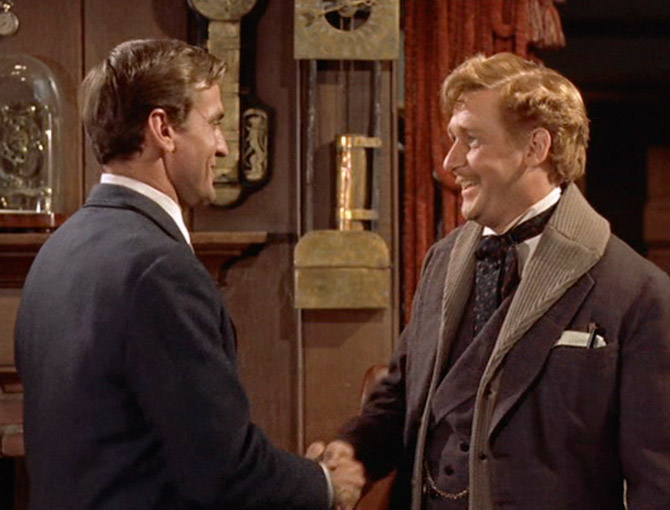The Time Machine (1960), starring Rod Taylor, Alan Young, Yvette Mimieux, by George Pal
In this adaptation of H.G. Wells’ classic novel, The Time Machine, a scientist in 1880s Victorian England builds a vehicle to transport him through time. He first travels to 1917 and the horror of World War I. Next, he sets his destination for 1940 and the start of World War II. From there he travels to a future London when he barely escapes nuclear holocaust. Finally, he sets his destination for the year 802,701 C.E., when he meets an innocent race of people living in an idyllic land … but this future may be the most dangerous of all his journeys in The Time Machine.
Review
H. G. Wells, in contrast, was a pessimist. He was also a socialist, where Pal had left Europe, and saw first-hand the effects of Socialism. Earlier in his career, with his Puppetoons shorts, he made several strong stands against Socialism, notably Tulips Shall Grow.
The Eloi learn
In addition, there’s a very different viewpoint on the Eloi and the Morlocks. The Eloi are the apathetic, pacifist, surface dwellers. They live in the ruins of their ancestors’ civilization. But there’s a turning point when George is fighting to rescue the helpless Eloi from the carnivorous Morlocks. One young Eloi sees how George is fighting bare handed. The camera pans down to his arm, where his fingers form a fist. And he starts fighting alongside George. Inspired, the other Eloi do the same. And humanity learns to fight for its’ survival again.
The story in photos

Arrival in the distant future
What has been lost
Talking Rings: My name is of no consequence. The important thing you should know, is that I am the last who remembers how each of us, man and woman made his own decision. Some chose to take refuge in the great caverns, and find a new way of life far below the earth’s surface. The rest of us decided to take our chances in the sunlight. Small as those chances might be.
The Morlocks provide the food and clothing for the Eloi. And harvest them, as humans harvest cattle. For the same reason.
What has been rediscovered
Return to the Present
Cast of characters
- Rod Taylor as H. George Wells. The protagonist and narrator. The inventor of the time machine, who travels into the future in search of a Utopia. Along the way, he makes several short stops, meeting the decedent of his best friend David. Eventually, he makes it in the distant future, finding the pacifist Eloi and the cannibal Morlocks.
- Alan Young as David Filby/James Filby. George’s best friend, a steadfast companion. Everyone should have a friend like Filby.
- Yvette Mimieux as Weena. The beautiful young Eloi that George rescues from drowning. As her apathetic friends simply watch. She learns to fall in love with him.
- Sebastian Cabot (Twice Told Tales, The Jungle Book) as Dr. Philip Hillyer. George’s pragmatic friend, who wants him to use his genius to help the war effort.
- Whit Bissell (Creature from the Black Lagoon) as Walter Kemp
- Doris Lloyd (Night Monster) as Mrs. Watchett. George’s house keeper. A motherly figure, who keeps an eye on him.
- Paul Frees as voice of the Rings
Editorial review of The Time Machine courtesy of Amazon.com
On January 5, 1900, a disheveled looking H. G. Wells – George to his friends – arrives late to his own dinner party. He tells his guests of his travels in his time machine, the work about which his friends knew. They were also unbelieving and skeptical of any practical use if it did indeed work. George knew that his machine was stationary in geographic position but he did not account for changes in what happens over times to that location he also learns that the machine is not impervious and he is not immune to understand him or the machine’s purpose.
George tells his friends that he did not find the Utopian society he so wished had developed. he mentions specifically a civilization several thousand years into the future which consists of the subterranean Morlocks and the surface dwelling Eloi, who on first glance lead a carefree life. Despite all these issues, love can still bloom over the spread of millennia.